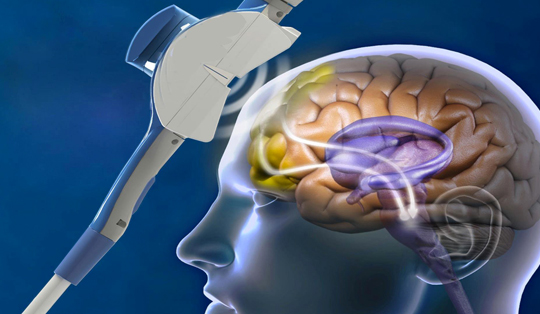What is Transcranial Magnetic Stimulation?
In 2008, the FDA approved the use of Transcranial magnetic stimulation, TMS, as a treatment for major depression and a medically cleared as a proven effective solution for other mental disorders. TMS is a noninvasive form of brain stimulation that uses magnetic pulses to stimulate nerve cells in the brain. TMS devices operate completely outside of the body and affect central nervous system activity by applying powerful magnetic fields to specific areas of the brain that we know are involved in depression.
TMS therapy provides local electromagnetic stimulation to specific brain regions known to be directly associated with mood regulation.These areas are known to be underactive in those diagnosed with depression. Stimulating these areas can improve the brain’s ability to regulate mood.

TMS doesn’t require anesthesia and it is generally exceptionally well tolerated as compared to the side effects often seen with medications and electroconvulsive therapy, (ECT). The most common side effect is a headache during or after treatment. A rare but serious side effect is seizures, and TMS may not be appropriate for people at high risk such as those with epilepsy, a history of head injury, or other serious neurologic issues.
TMS is a safe and effective treatment for individuals diagnosed with Major Depressive Disorder (MDD) who have not experienced satisfactory improvement from antidepressant medication or who feel medication is causing unwanted side effects. TMS Therapy can be used as a stand-alone treatment or used in conjunction with medication.
What is TMS used for?
Major Depressive Disorder In 2008, the FDA approved the use of TMS therapy as a noninvasive treatment for major depression disorder. People suffering from major depression often have severe difficulty working, sleeping, concentrating, eating and enjoying life. Many individuals with major depressive conditions also struggle with the adverse side effects of antidepressant medication and treatment-resistant symptoms.
What to Expect from TMS therapy?
Major Depressive Disorder
Your doctor and you, in collaboration, will decide if TMS may be right for you. You will then meet one of our therapists who will take a full history and conduct an evaluation, which will include objective tests and scales for depression, fatigue etc. This will be done regularly during your treatment as well to monitor your progress. We will then attempt to obtain prior authorization from your insurance. You also have the option of financing your TMS treatment. You will then watch a video of the TMS procedure and be given an opportunity to ask any questions. Our TMS specialist and your doctor will answer any questions you may have.
Treatments
A doctor and TMS specialists will measure the location of treatment and determine the amount of electromagnetic pulse that will be most beneficial to you. It is done by placing the coil on your head and producing one magnetic pulse while watching for movements in the hand and fingers.
During subsequent treatments a coil will be placed on your head. The TMS machine will be set to your specific treatment measurements. You will hear a clicking noise and feel tapping on your head.
Treatment lasts 20-40 minutes and are conducted daily, 5 days a week for 4-6 weeks (20-30 sessions). Some patients may benefit from maintenance therapy after their initial treatment course. Please make sure you attend the full course of therapy to get the most benefit from treatment.
Frequently Asked Questions
IS TMS THERAPY UNCOMFORTABLE?
We take every precaution to begin our pulses at the lowest possible intensity while increasing it as necessary depending on how the brain responds to the magnetic pulses.
Is TMS right for me?
If you suffer from Major Depression and have not found a satisfactory treatment with antidepressant medication, TMS may be the next best step for you.
Does TMS cause memory loss?
No, there is no memory loss known to correspond with TMS therapy.
What are the side effects of TMS Therapy?
TMS is well tolerated and associated with few side effects. The most common side effect is experiencing headaches after the first two or three treatments. This is because the brain is not used to experiencing targeted magnetic pulses. After the first week of treatment, however, the vast majority of patients stop experiencing headaches over the course of treatment.




